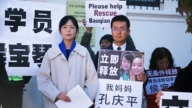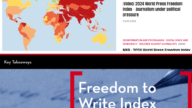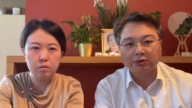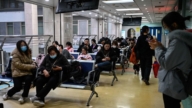【新唐人2011年9月22日讯】曾追踪报导地沟油丑闻的河南记者李翔,身中十几刀遇刺身亡,再度引起国内舆论对地沟油猖獗的关注。专家估计,中国人每10顿饭可能就有1顿吃到地沟油。海内外评论指出,权贵特供体系滋生地沟油等有毒食品,中共的腐败体制加剧社会道德沦丧和民众生存危机。
河南洛阳电视台记者李翔9月18号回家途中,被人连捅13刀身亡,随身携带的电脑包被抢。20号,两名嫌犯被抓获,警方通报说是酒后抢劫杀人。
今年30岁的李翔负责洛阳电视台民生、法制报导。他15号发布生前最后一则微博,与当地炼制地沟油窝点有关。早前外界猜测,他的死因可能是“地沟油商买凶杀人”。
《无国界记者》组织发表声明,对李翔被刺身亡表示震惊。《郑州日报》报导说,李翔遇害被怀疑与地沟油有关,实质在一定程度上也成了公众对地沟油焦虑舆情的渲泄口。
所谓地沟油是从下水道中捞取的泔水残渣、餐饮垃圾,经过加工、脱色脱臭后,重新变成清亮的一种油,外观和沙拉油没什么差别。
医学研究显示,地沟油中所含的黄麦霉素是一种强烈的致癌物质,毒性是砒霜的100倍。
全国粮油标准化委员会油料和油脂工作组组长何东平教授去年说,目前全中国每年返回餐桌的地沟油有200-300万吨,占全中国食用油市场十分之一。但他随后否认说过这样的话,并表示“压力很大”。
黄良天(《百姓》杂志前主编):“应该是受到一些压力,因为他这种言论影响了安定团结的社会局面,造成人心恐慌,以这个借口肯定他那个。他说出来应该是很自然的,后来出来改口应该是不自然的,能够对他造成压力肯定不是老百姓。”
“华农食品科技学院”教授王承明认为,何东平所说的只是保守的数字,2009年全中国地沟油的使用量达400-500万吨。
经济学家郎咸平指出,暴利造就了中国地沟油产业链,地沟油行业一年的总利润达到15-20亿元。
近日,浙江、山东、河南等地摧毁了一个跨越14个省的地沟油网络,查获地沟油100多吨、已罐装假冒品牌“食用油”100多箱,抓获主要嫌犯32名。
“济南格林生物能源公司”以生产销售生物柴油为名,从浙江、四川、贵州等地收购粗炼过的地沟油,加工为成品油,产量达每天数十吨,批发给一些粮油公司流入食品市场,或者罐装零售给宾馆、饭店、夜排档、油条摊。
16号,乌鲁木齐市也查获了一个地沟油加工厂,把又脏又臭的地沟油加工制成酸化油,卖给化工厂成为生产香皂和油漆的原料。
《南方都市报》评论指出,地沟油:又一个“谁都在管谁都不管”。《新华网》时评说,在警方侦破的地沟油案件中,淘捞、粗炼、倒卖、深加工、批发、零售等各个环节,都没有看到监管部门的身影。
英国《金融时报》20号的文章指出,权贵“特供”经济,将中共官员食品排除在市场体系之外,每一级官员都会如法炮制,让自己成为有毒食品中的安全孤岛。
《新华网》16号报导,浙江丽水遂昌县的绿色农产品基地,保障了浙江一些政府部门和单位的内部供应,因而变成“特供农场”。当地农业局进行了反驳,但网络上依然群情汹涌。
朱健国(深圳独立作家):“比如说国务院现在已经有很多的资料和文章证明,他们几十年来一贯制的在吃着特供食品﹔各地的政府都有形形色色的特供渠道,富豪执政者他根本就感觉不到食品安全问题。还有个问题就是他们的官商勾结,一旦要真正动手,就要危害他们企业界的朋友,比如说三聚氰胺的都是王牌企业。”
《金融时报》的评论指出,如同以往历次执法,没有人因为大范围的有毒食品泛滥被问责。可怕的食品安全显示出(中国)社会道德无底线、诚信彻底缺失、公平市场规则的沦丧。
新唐人记者常春、李元翰、黎安安采访报导。
Hogwash Oil: For Public Only
Henan journalist, Li Xiang, was stabbed for his investigation
of hogwash oil scandals, spotlighting the scandal once again.
It is said that on average, every Chinese has one out of ten
meals cooked with hogwash oil.
Critics believe that this special provision system
leads to tainted food problems.
The Chinese Communist Party’s (CCP) corruption system
destroys morality and threatens lives.
Journalist Li Xiang from Henan Luoyang TV was stabbed
13 times on his way home on September 18.
His computer was also taken from his home.
On September 20, police announced that two suspects
were arrested for robbery.
The 30-years old TV journalist was reporting on legal issues.
His last microblog on September 15 was about hogwash oil.
Some believe that hogwash oil manufacturers
may have paid someone to murder him.
Reporters Without Borders released a statement
expressing their shock.
Zhenzhou Daily stated that the allegation of the murder
being related to Li Xiang’s hogwash oil reports,
shows to some extent the public’s concern
about the hogwash oil issue.
Hogwash oil is a refined oil from food leftovers,
kitchen trash, and sewage water.
After special treatment for color and odor,
it looks clear, like normal salad oil.
Medical research shows however, that hogwash oil contains
a strong carcinogen, 10 times more poisonous than arsenic.
He Dongping, expert from National Food and Oil Standard
Committee said last year,
that 2-3 million tons of hogwash oil is used annually,
making up to 1/10 of China’s total oil consumption.
However, later he denied what he said in his speech,
explaining that he was under “a lot of pressure” afterwards.
Huang Liangtian (Former editor, Bai Xing magazine):
“He must have suffered some pressure,
because his speech was viewed as stirring public concerns,
and affecting social stability.
What he said was the truth, his denying it later was not.
Whoever put pressure on him won’t just be a public member.”
Professor Wang Chenming from Huanong Food Technology
College believes that the given by He Dongping figure
was underestimated. Professor Wang claims that in 2009,
hogwash oil consumption was 4-5 million tons.
Economist Lang Xianping explained how China’s hogwash
oil industry is highly lucrative, with its ca. RMB2 bill. a year.
Recently, a hogwash oil marketing network
in more than 14 provinces was exposed,
with over 10 tons of oil and 100 boxes of fake brands
cooking oil confiscated, and 32 suspects arrested.
Under the name of producing bio diesel, the Jinan Gelin
Bio Energy company collected crude hogwash oil
from other provinces, and refined them into oil,
with a daily production of more than 10 tons.
Then, they wholesaled or retailed them to food markets,
hotels, restaurants or street stalls.
On September 16, Wulumuqi City also found
a hogwash oil production facility.
The dirty and smelly oil was processed
and sold to chemical factories to make soaps or paints.
Commentaries from South Metropolis Daily said, hogwash
oil is just another issue the government does nothing about.
Xinhua News Agency said that when reviewing the cases
of hogwash oil, in every stage, from collection, refinement,
wholesale to retail, one could never find
any government agency monitoring.
Financial Times’ article from Sept. 20 states, the officials’
Special Provision System removes their food from the market.
Throughout China people are trying to copy this system
to stay safe amidst the booming industry of tainted foods.
Xinhua website reported on September 16, that the organic
farm at Suichang Jiangsu was transformed into a special farm
supplier to provincial governments, which was refuted by
local agriculture agency, but criticism flooded the micro blogs.
Zhu Jiangu (Shenzhen Independent Writer):
“State Council has many documents
showing that they have been enjoying special food supplies,
and every local government has their own provision channel.
The rich officials never feel the threats of tainted foods.
Even worse, officials and businessman collaborate, so they wouldn’t harm each other.
The company producing tainted baby formula
was labeled as a premier business.”
Financial Times’ commentaries note that just like before,
nobody is ever held responsible for tainted foods.
The terrible state of food safety shows how China’s society
is losing moral grounds on honesty and fairness.
NTD reporters Chang Chun, Li Yuanhan and Li Anan































